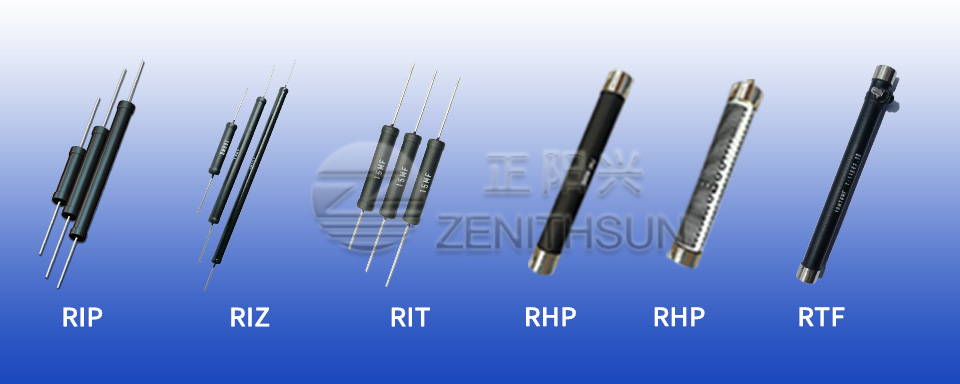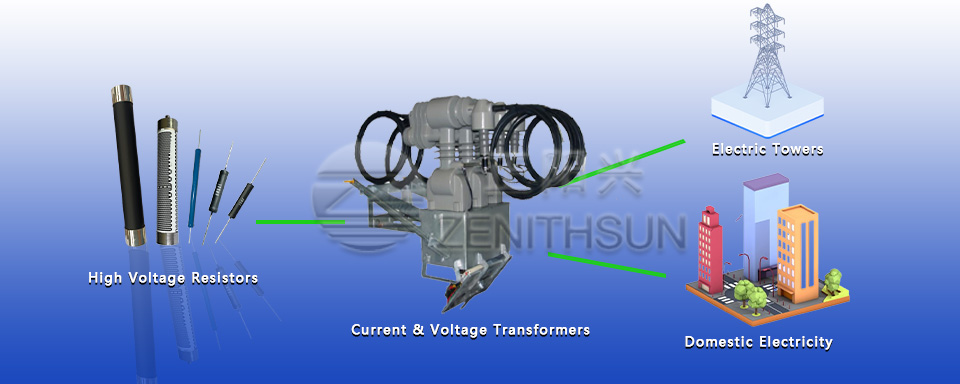High voltage resistors refer to resistive devices that can withstand high voltages. Generally, resistors with a rated voltage of 1 kV (kilovolts) and above are called high voltage resistors, and the rated voltage of high-voltage resistors can reach hundreds of kilovolts.
There are many types and structures of high voltage resistors. The resistivity of high-voltage resistors is high, and the dielectric strength of the material itself is also high. Therefore, it can work stably in harsh environments such as high voltage, high temperature, and high humidity. In addition, high-voltage resistors also need to have sufficient insulation capabilities and moisture-proof properties to avoid breakdown under high-voltage electric fields. If there are special requirements, it must also have characteristics such as anti-high frequency, anti-interference, overload, and fire protection.
Therefore, high voltage resistors are resistive devices with high precision, high reliability and high voltage resistance. They are widely used in high-voltage power supplies, testing instruments, power equipment, image recognition systems, particle accelerators and other fields.
Therefore, high voltage resistors have the following seven characteristics:
High Voltage: High voltage resistors have higher voltage ratings and can withstand voltages from thousands to hundreds of kilovolts.
High resistance value: Since high-voltage resistors are usually used in high-voltage applications, their resistance values are often large and can reach hundreds of megaohms or more.
High voltage resistance: High voltage resistors need to work stably in high-voltage environments.
More stable: High-voltage resistors need to work in high-pressure and high-temperature environments for a long time, so their stability and reliability need to be guaranteed. Good thermal stability: High-voltage resistors are prone to drift due to high temperatures, so high-voltage resistors with good thermal stability can better ensure circuit accuracy.
High insulation: High-voltage resistors need to have good insulation properties to avoid safety issues such as electrical breakdown and leakage.
High precision: High-voltage resistors are mostly used in circuits or instruments that require higher precision, so higher precision is necessary. Based on the above characteristics, the following six factors need to be considered when selecting high-voltage resistors:
Rated voltage: It is necessary to confirm whether the rated voltage of the selected high-voltage resistor meets the actual needs. When selecting a resistor, you should ensure that its rated voltage is higher than the working voltage of the circuit, preferably more than double, to ensure that the resistor will not fail or be damaged during use.
Resistor value: The resistance value of the selected high voltage resistor needs to be determined based on the required circuit function and design requirements.
If you need to reduce high voltage, you can choose a higher resistor value; if you need to withstand current at high voltage, you can choose a lower resistor value.
Resistor accuracy: In high-precision circuits or instruments, high voltage resistors with higher accuracy need to be selected. If the circuit accuracy is not high, you can choose a high-voltage resistor with general accuracy.
Reliability: It is necessary to choose high-voltage resistors that can still work stably in high temperature, high humidity, pollution and other environments. For circuits with long-term or continuous use, it is necessary to choose high-voltage resistors with good reliability.
Environmental protection: With the improvement of environmental awareness, environmentally friendly high-voltage resistors have also received more and more attention. It is necessary to choose high-voltage resistor products that meet environmental protection standards.
Brand: It is best to choose manufacturers and brands with high visibility, good reputation and guaranteed quality.








